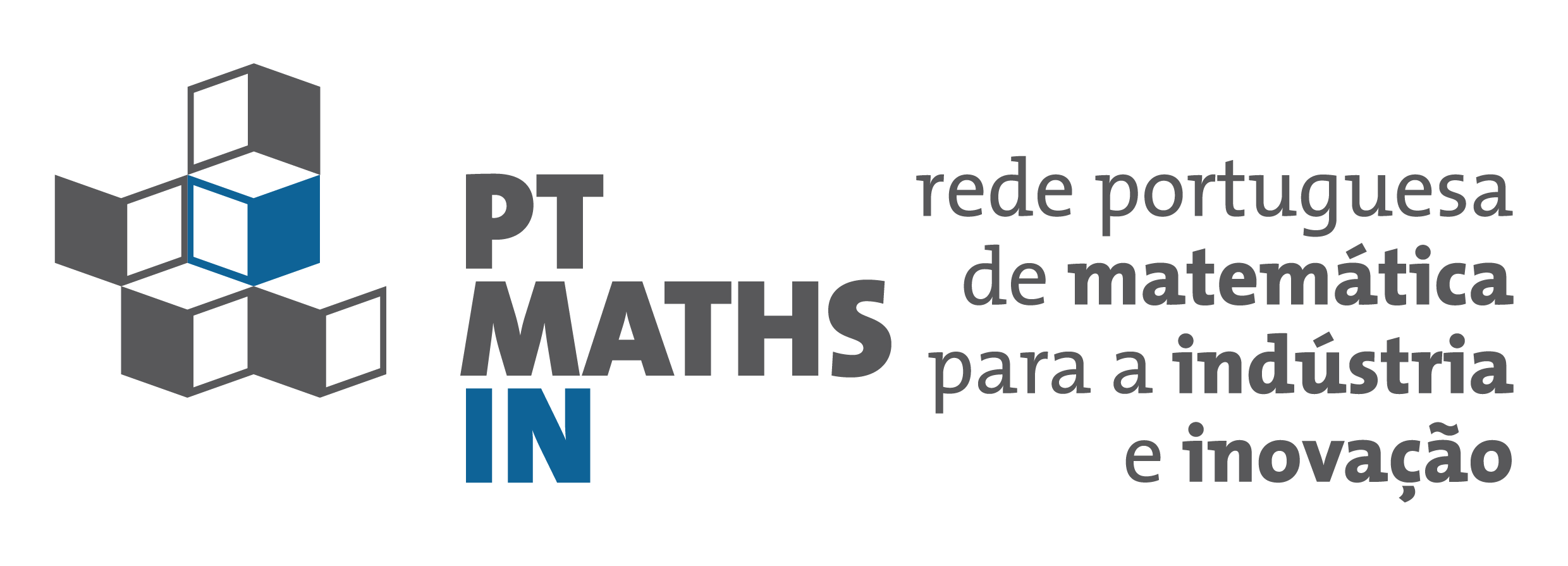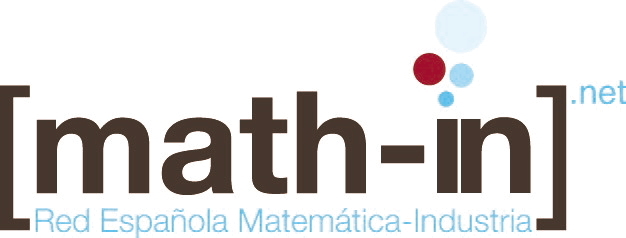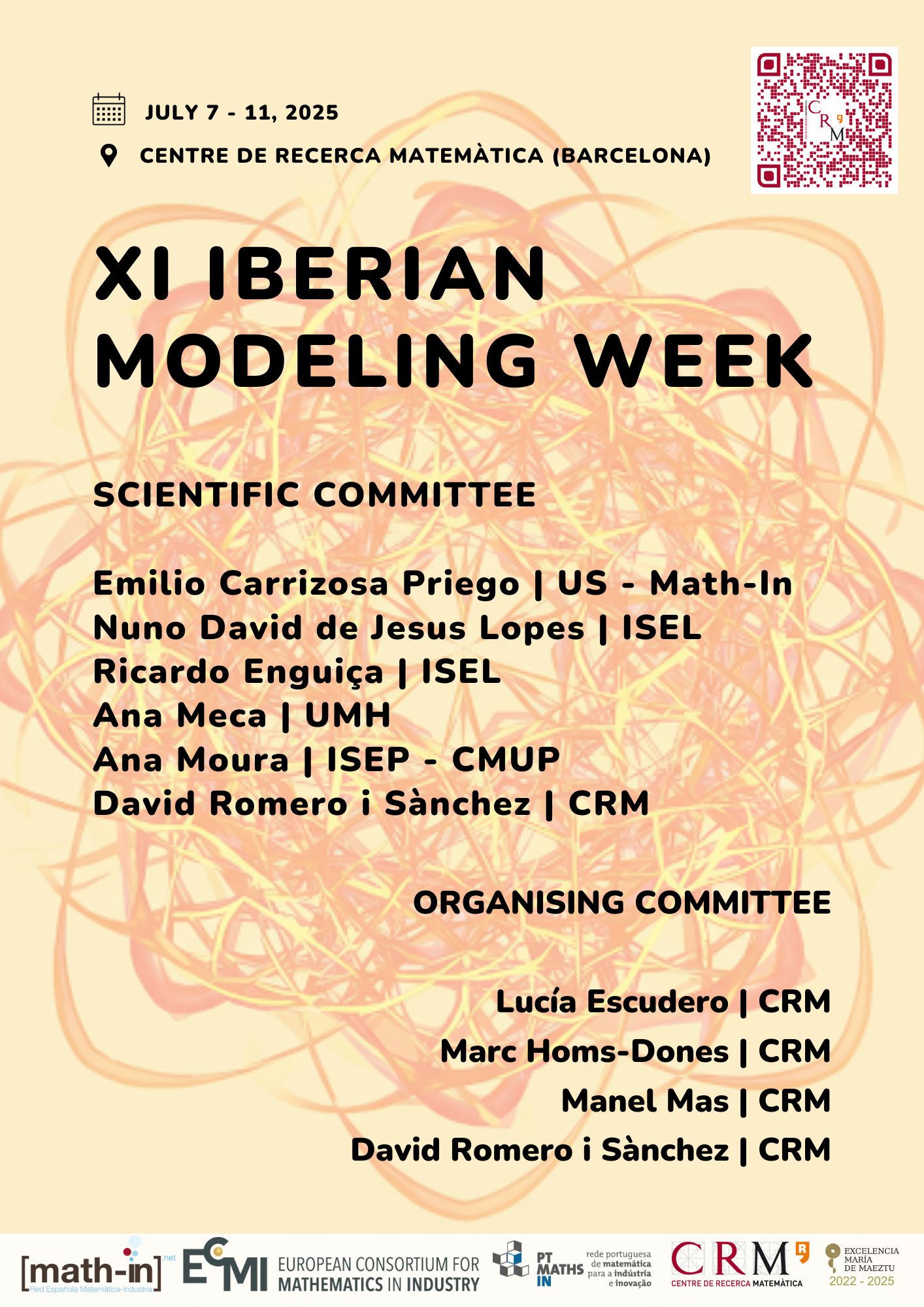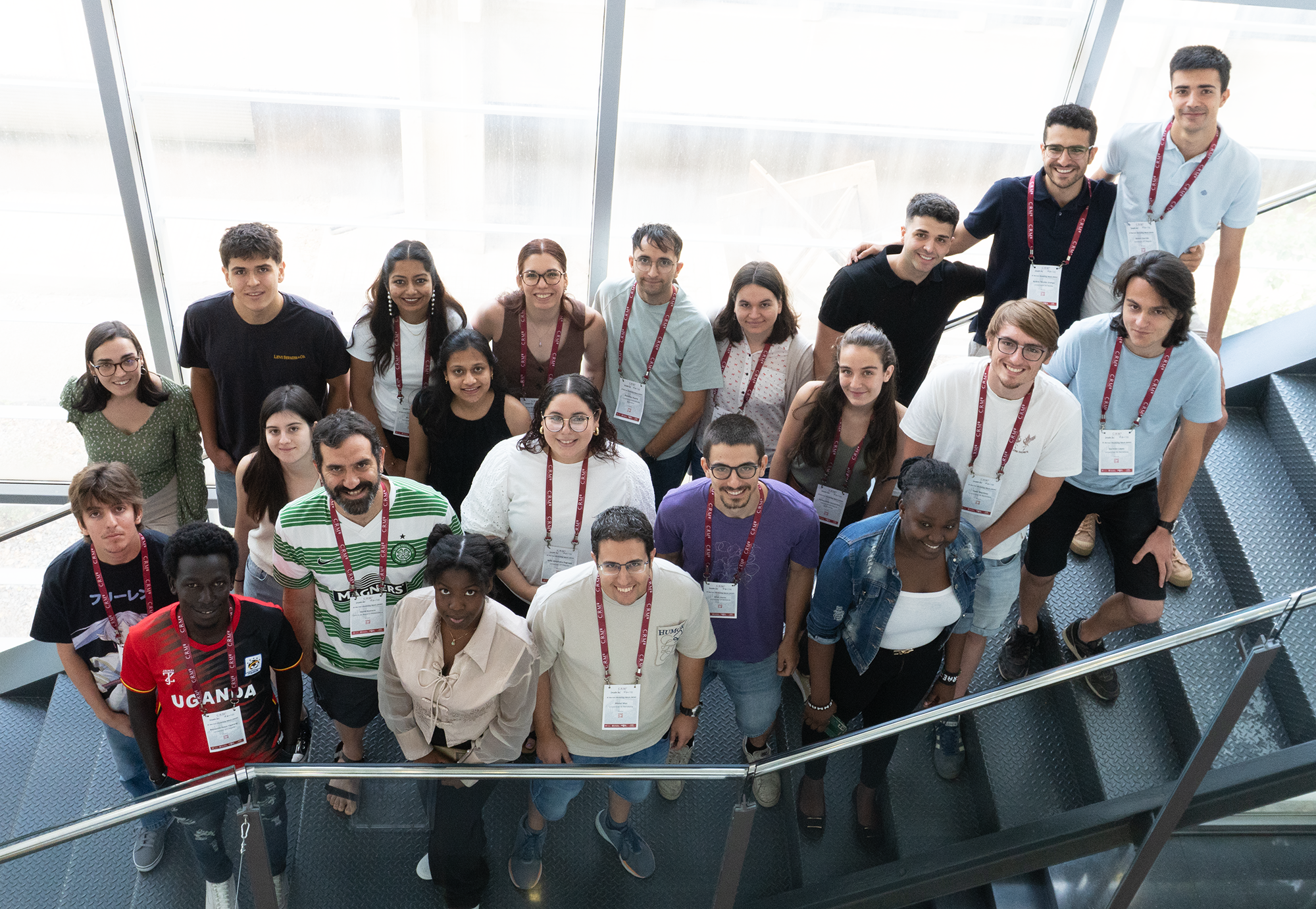XI Iberian Modeling Week (IMW)
Sign into July 11, 2025
Venue: CRM
Introduction
The IMW is a joint initiative of pt-maths-in (Portugal) and math-in (Spain), designed to introduce undergraduate and master’s students to industrial mathematics through hands-on problem-solving. Each year, students from both countries work in teams on real-world challenges proposed by companies, under the supervision of academic and industry mentors.
IMW aims to:
• Train students in applied mathematical modeling, encouraging innovative problem-solving.
• Foster collaboration between young mathematicians, preparing them for industry or
research careers.
• Strengthen ties between Portugal, Spain, and industry through cross-border cooperation.
By working in an international environment and tackling real challenges, students develop key skills in mathematical modeling, teamwork, and communication while contributing to practical industry solutions. Moreover, by hosting both IMW and ESGI back-to-back, CRM would maximize the interaction between students, researchers, and industry professionals, reinforcing the role of mathematics in solving industrial challenges and driving innovation.
objective
The IMW will feature four to five problems, each assigned to a team of five to six students.
Each team will work under the guidance of a senior researcher, applying mathematical modeling techniques to tackle real-world challenges. The problems, which are tentative at thisstage, are expected to come from fields such as mobility, optimization, and pharmaceuticals.
This structure aims to provide students with hands-on experience in industrial mathematics while fostering teamwork and collaboration.
Problems
Efficient Bus Allocation
Optimal Placement of Climate Shelters
Modeling Hemodynamics During Venous Occlusion
Balancing Energy Harvesting and Flow Efficiency in Asphalt Solar Collectors
SCHEDULE
Monday July 7th, 2025 | Tuesday July 8th, 2025 | Wednesday July 9th, 2025 | Thursday July 10th, 2025 | Friday July 11th, 2025 | |
09:00 - 09:45 | (09:00 - 09:30) Registration (09:30 - 09:45) Welcome | Discussions | Presentation of Modeling Outcomes | ||
09:45 - 10:30 | (09:45 -10:15) Introduction of challenges | Discussions | Presentation of Modeling Outcomes | ||
10:30 - 11:00 | Coffee break | Group picture + Coffee break | Coffee break | ||
11:00 - 11:45 | Discussions | Presentation of Modeling Outcomes | |||
11:45 - 12:30 | Discussions | Presentation of Modeling Outcomes | |||
12:30 - 13:15 | Discussions | Presentation of Modeling Outcomes | |||
13:15 - 14:30 | Lunch | Lunch | |||
14:30 - 15:15 | Discussions | ||||
15:15 - 16:00 | Discussions | ||||
Scientific Committee
Emilio Carrizosa Priego | Universidad de Sevilla – Math-In
Nuno David de Jesus Lopes | Instituto Superior de Engenharia de Lisboa
Ricardo Enguiça | Instituto Superior de Engenharia de Lisboa – PT-Maths-In
Ana Meca | Universidad Miguel Hernández
Ana Moura | School of Enginnering, Polythecnic of Porto – Centre of Mathematics of University of Porto – PT-Maths-In
David Romero i Sànchez | Centre de Recerca Matemàtica
Organising Committee
Lucía Escudero | Centre de Recerca Matemàtica
Marc Homs-Dones | Centre de Recerca Matemàtica
Manel Mas | Centre de Recerca Matemàtica
David Romero i Sànchez | Centre de Recerca Matemàtica
LIST OF PARTICIPANTS
| Name | Institution |
|---|---|
| Nuno Lopes | Instituto Superior de Engenharia de Lisboa |
| Ricardo Enguiça | Instituto Superior de Engenharia de Lisboa - PT-Maths-In |
| Ana Meca | Universidad Miguel Hernández |
| Emilio Carrizosa Priego | Universidad de Sevilla – Math-In |
| Ana Moura | School of Enginnering, Polythecnic of Porto – Centre of Mathematics of University of Porto – PT-Maths-In |
| Roger Carrillo | Youth and Science (Fundació Catalunya La Pedrera) |
| Isaac Martinez Escribano | Universitat de Barcelona |
| Germán López Izquierdo | Universitat de Barcelona |
| Manel Mas | Universitat de Barcelona |
| Natan Sisoev | Universitat Autònoma de Barcelona |
| Domènec Huerta Estradé | Universitat Autònoma de Barcelona |
| Lucía Escudero Sartages | Real Universidade de Santiago de Compostela |
| Andrés Nicolás Uranga Limón | Universidad de Sevilla |
| Lorenzo Tagua Santana | Universidad de Sevilla |
| Luna Sánchez Barrera | Universidad Politécnica de Madrid |
| Alexandra Torres | Universidad Politécnica de Madrid |
| María García de la Santa Viñuela | Universidad Politécnica de Madrid |
| David Herrero | Universidad Politécnica de Madrid |
| Angelica Chanvoedou Abaga | Universidad Rey Juan Carlos |
| Inmaculada Fernandez Alfonso | Vienna University of Technology |
| Achala Punase | University of Hamburg |
| Benjamin Peter Ogwang | University of L'Aquila |
| Sofia Alejandra Pagoaga Hernandez | University of L'Aquila |
| Alvaro Garrido Simarro | University of L'Aquila |
| Shruti Nair | University of L'Aquila |
| Afonso Ferreira | Universidade Nova de Lisboa |
| Marc Homs-Dones | University of Warwick |
| David Romero i Sànchez | Centre de Recerca Matemàtica |
acknowledgement



INVOICE/PAYMENT INFORMATION
IF YOUR INSTITUTION COVERS YOUR REGISTRATION FEE: Please note that, in case your institution is paying for the registration via bank transfer, you will have to indicate your institution details and choose “Transfer” as the payment method at the end of the process.
UPF | UB | UPC | UAB
*If the paying institution is the UPF / UB/ UPC / UAB, after registering, please send an email to comptabilitat@crm.cat with your name and the institution internal reference number that we will need to issue the electronic invoice. Please, send us the Project code covering the registration if needed.
Paying by credit card
IF YOU PAY VIA CREDIT CARD but you need to provide the invoice to your institution to be reimbursed, please note that we will also need you to send an email to comptabilitat@crm.cat providing the internal reference number given by your institution and the code of the Project covering the registration (if necessary).
LODGING INFORMATION
ON-CAMPUS AND BELLATERRA
BARCELONA AND OFF-CAMPUS
|
For inquiries about this event please contact the Scientific Events Coordinator Ms. Núria Hernández at nhernandez@crm.cat
|
scam warning
We are aware of a number of current scams targeting participants at CRM activities concerning registration or accommodation bookings. If you are approached by a third party (eg travellerpoint.org, Conference Committee, Global Travel Experts or Royal Visit) asking for booking or payment details, please ignore them.
Please remember:
i) CRM never uses third parties to do our administration for events: messages will come directly from CRM staff
ii) CRM will never ask participants for credit card or bank details
iii) If you have any doubt about an email you receive please get in touch
Asphalt solar collectors embed fluid pipes in roads to harvest heat, but longer or denser layouts increase flow resistance: raising pressure drop and pump energy use. In this challenge, participants will explore the trade-off between thermal energy harvested and pressure losses in an asphalt solar collector. You’ll be provided with key physical parameters such as pipe diameter, length, layout (e.g., serpentine vs. spiral), fluid properties (water with temperature-dependent viscosity), and solar radiation data. The goal is to analyze different pipe configurations and flow strategies, and provide insights into which setups offer the best balance between heat collection and pumping efficiency.
With the increasing frequency of extreme temperature events due to climate change, climate shelters (such as libraries, community centers, or public swimming pools) play a key role in offering relief during periods of intense summer heat. In this challenge, participants are given demographic and geographic data (e.g., population density, age distribution, income levels, existing infrastructure) to determine the optimal locations for climate shelters within a city or region. The goal is to develop a model or algorithm that maximizes accessibility and equity, ensuring that those most at risk from heatwaves can easily reach a shelter. Considerations may include walking distance, shelter capacity, and urban heat island effects.
For biomedical diagnostics, understanding blood flow dynamics during venous occlusion is essential. In this challenge, participants are provided with experimental data (from near-infrared spectroscopy measurements) capturing hemodynamic responses in a human limb during a controlled venous occlusion. The goal is to adapt and refine a mathematical model (based on the Windkessel model) to describe key physiological changes such as blood volume increase, flow reduction, and oxygen saturation variations. Participants will work on identifying meaningful parameters and time constants from the data, comparing the model’s behavior to observations, and gaining insight into how such models can support the development of non-invasive diagnostic techniques.
For a public transport companies, it is important to determine the hourly number of buses required to meet passenger demand throughout a typical day. Given a forecast of daily demand patterns and origin-destination data, the challenge involves estimating trip durations by modeling factors such as bus movement, route alignment, boarding times, and stop frequency. To ensure efficient and eco-conscious operations, participants must also consider synchronization strategies between buses to reduce waiting and travel times, aiming to minimize fleet size, fuel consumption, and environmental impact.






















